|
Blue Bell Hill
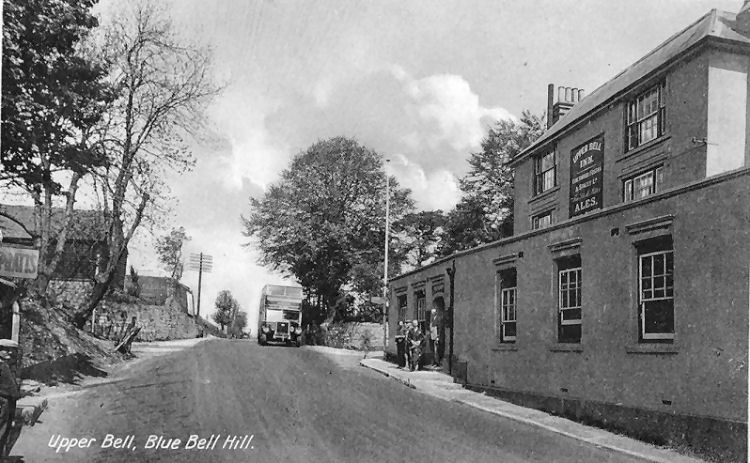
Above postcard, circa 1920. Kindly sent by Rory Kehoe. |
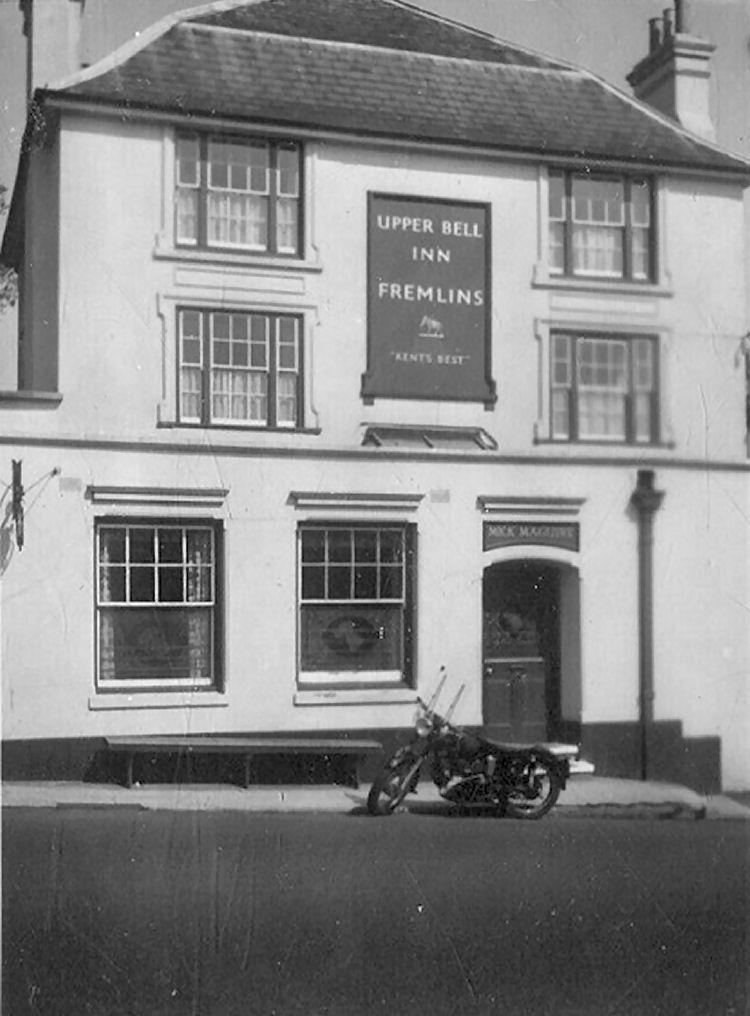
Above photo circa 1956, kindly sent by Rory Kehoe. The motorbike
parked outside is a Matchless 350 registration SKP 752. |
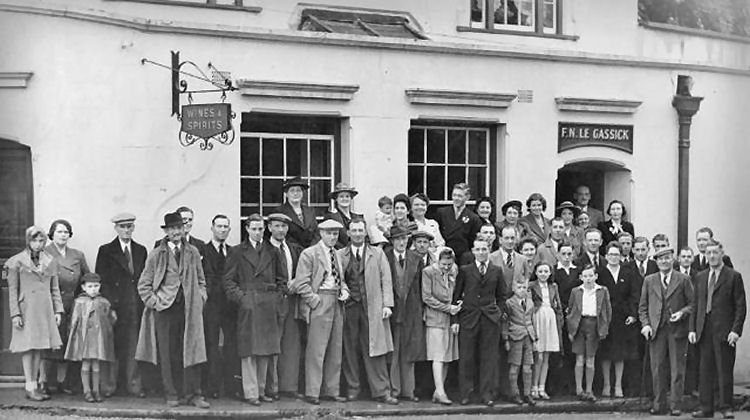
Above photo, by Bob Auger, circa 1960s. |
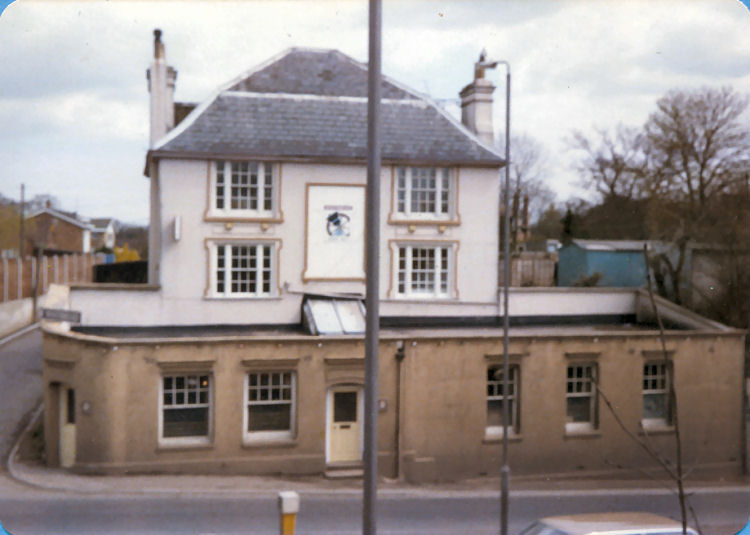
Above photo date 1978, from www.Flickr.com
by Ben Levick. |
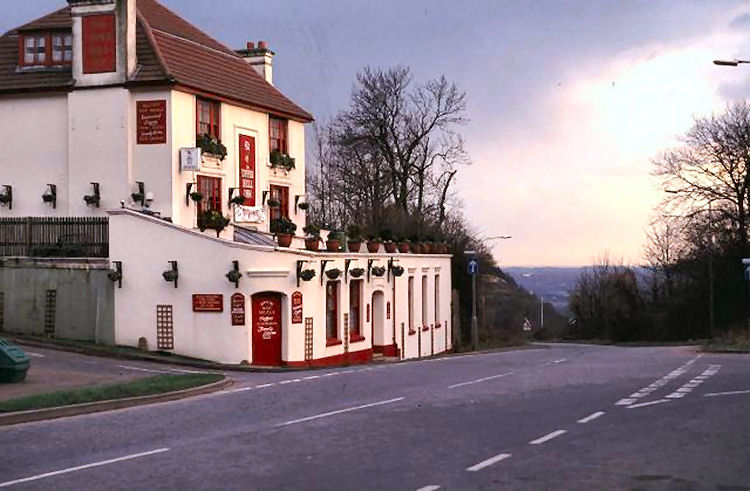
Above photo 2000 by Sean Tudor. |
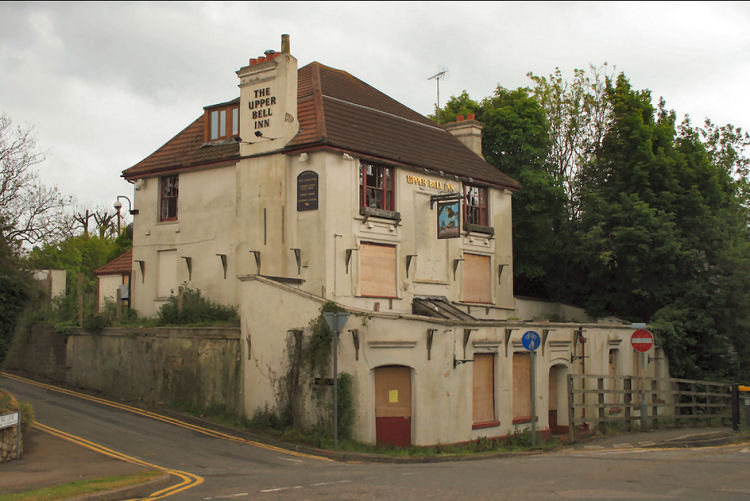
Above photo 12 may, 2007, by Ray Garlick from
https://www.flickr.com |
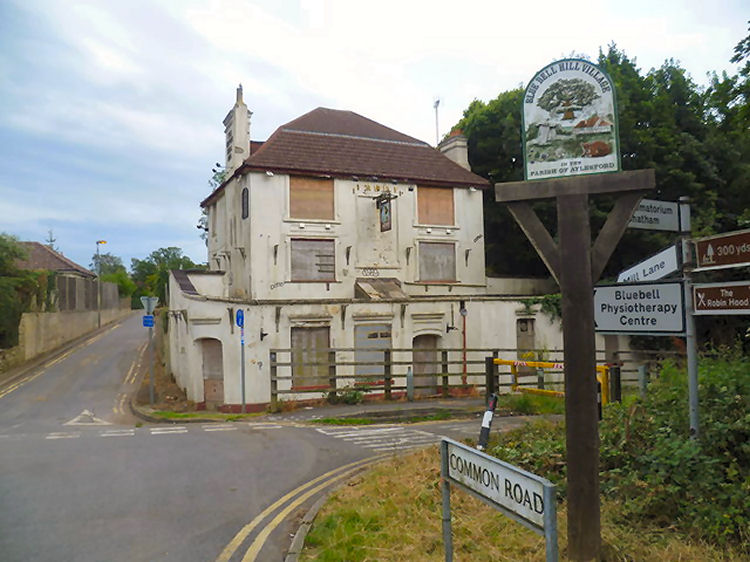
Above photo 2012 by Ian Yardham
Creative Commons Licence. |
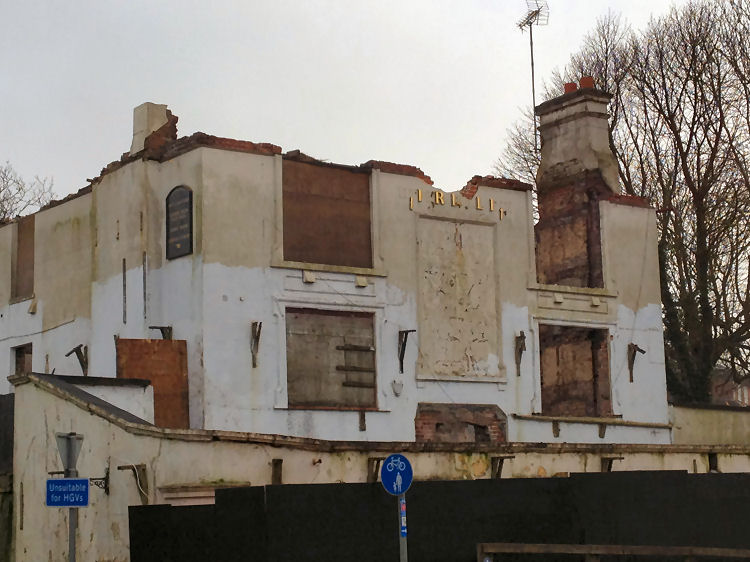
Above photo, January 2013, kindly taken and sent by Mike Aronson. |
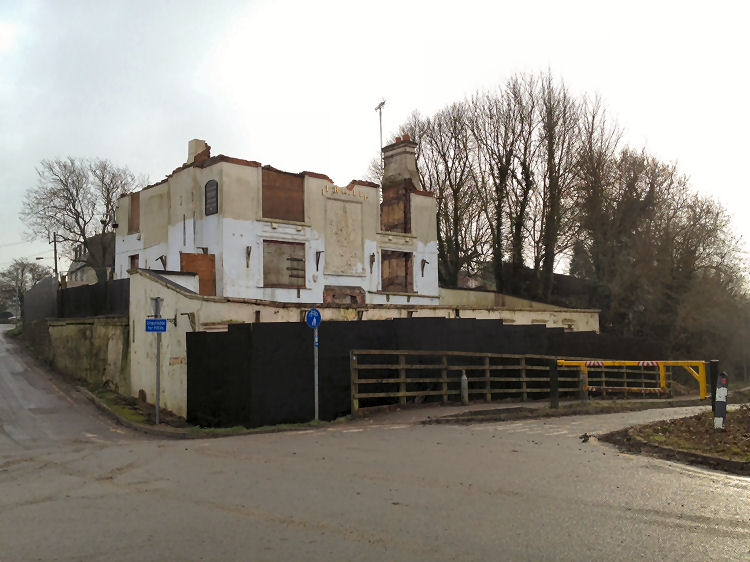
Above photo, January 2013, kindly taken and sent by Mike Aronson. |
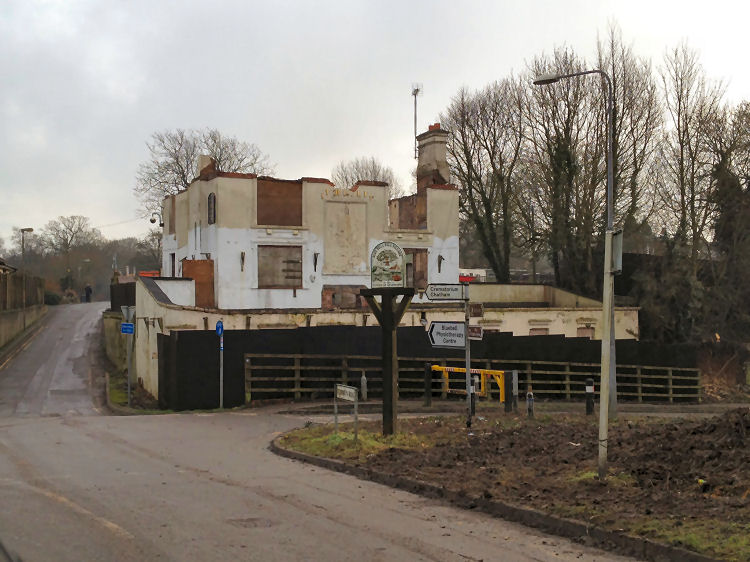
Above photo, January 2013, kindly taken and sent by Mike Aronson. |
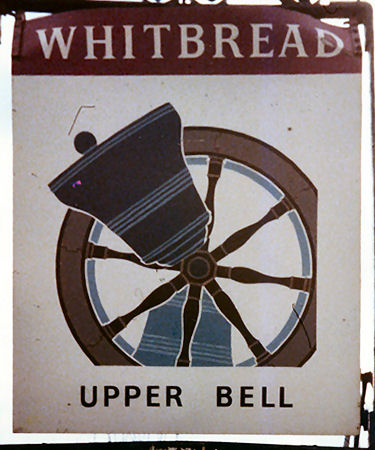 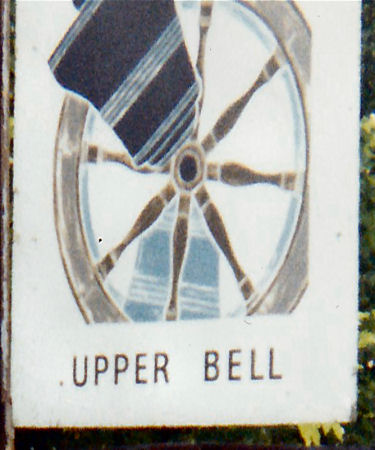
Above sign left 1978, sign right, July 1986.
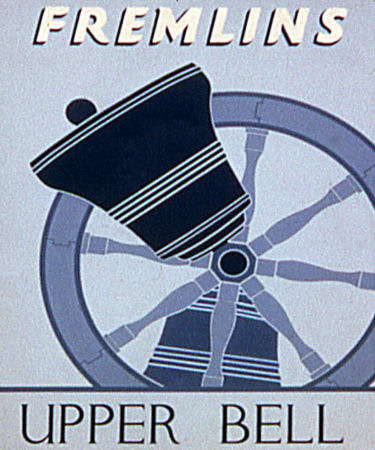
Above sign 1964.
With thanks from Brian Curtis
www.innsignsociety.com. |
I believe this to be the older of the two "Bells" and Wright's
Topography of 1838 referred to it as the "Old Bell." The Kelly's
directory of 1903 also referred to this as the "Old Bell," and addressed as
at Burham, Rochester.
It has been said that unusually the cellar was located above and behind
the public bar. The Landlord simply had to turn the tap on to pour a pint.
In due course a new & much larger bar was opened upstairs.
|
From the Kentish Gazette, 28 September 1810.
On Saturday the body of a man, in a very putrid state, was found
lying on the ground, with a bundle by his side, in a wood near the
"Upper Bell," on the Maidstone road from Chatham. On inquiry it
proves to be the body of a man, of the name of Saunders, a shoemaker
lately resident at Dartford; he had travelled by coach as far as the
"Bell" nearly eleven weeks ago, when he stopped at the house and
drank two pints of beer and eat some bread and cheese, he then went
out, and was absent for a short time, when he returned and drank two
pints more of beer, and again eat some bread and cheese, after which
he left the house, and had never been seen or heard of till
discovered on Saturday.
|
|
From the Observer 13 October 1816. Transcribed from
http://www.naomiclifford.com
AFFECTING CIRCUMSTANCE.
On Sunday, the 22nd ult. as some young men were nutting in the woods
near the "Old Upper Blue Bell," on the old road to Maidstone, they
observed a female lying under a tree apparently asleep, and passed on
without disturbing her. On the succeeding Friday the young men again
went nutting to the same place, when to their extreme surprise they saw
the female lying in the precise place and attitude in which they had
seen her before: one of them went to her, and took her by the hand; she
was alive, but in such a situation as excited the most shuddering
sensations of horror and disgust, mixed with surprise, that a human
being could retain any portion of animation under such complicated
sufferings of want and wretchedness. She was almost in a state of
putrefaction, large maggots were feeding on every part of her frame;
exposed to the attack of flies; her nostrils, and even her mouth were
infested by them; behind her ears, between her fingers, and between her
toes, they were drawling in sickening quantities; and her clothes were
literally rotten from long exposure to the varying and humid atmosphere. With a laudable alacrity they applied for
assistance at the "Blue Bell," and with the assistance of two men the
unfortunate sufferer was placed upon a hurdle, and conveyed to an
outhouse, where such necessaries and comforts as could be procured were
immediately prepared for her. Mr. Browne, surgeon, of Rochester, was
sent for, and immediately came to visit her; and through his humane,
kind, and constant attention, this unfortunate woman has been rescued
from the jaws of death, and is now in a fair way of recovery. The
account she gives of herself is, that her name is Ann Martin; she came
from Lewes some time back with an artillery soldier to Chatham barracks;
but that she had left him, and had determined on returning home to
Lewes; that being destitute of money, and oppressed by fatigue, she, in
a fit of despair, laid herself down to die; that she had lain where she
was discovered ever since the Sunday preceding that on which she was
first seen, and consequently had been eleven days and nights without any
kind of food! |
|
From the Maidstone Gazette and West Kent Courier, 19 January 1830.
Pig stealing.
Thomas Curtis, 37, for stealing two pigs, Valley £3, the property of
John Roper, at Thurnham.
Mr. Pollock appeared for the prosecution, and called the following
witnesses:-
John Roper examined:- I live at Thurnham. On the 5th of November, I
missed two pigs from my yard. They were two open sows; one had a blue
mark on the rump; they weighed about three score each, and were seven
months old. When I saw them again they were dead and dressed; one was
cut up. I could not swear to the identity of the pigs when I saw them at
Farleigh.
John Ashby:- I live at East Farleigh. On the 6th of November, between 7
and 8 o'clock in the morning, I was in Cradock's yard, which is between
5 and 6 miles from Mr. Roper's. There were no pigs in the yard; one had
a blue mark by its rump; they were both open sows. Prisoner lodged with
me at Cradock's. At 10 in the day, he came home, and asked if I had seen
anything of the man that drove his pigs home the night before. I said I
had not. He owned the sows in the yard. He and I slept in the same room.
He was out all the night of the 5th. He told me he had slept at the
"Upper Bell." I went to work and returned in the afternoon, while he was
dressing the pigs. Saturday morning, he asked me to buy one of the pigs
for 8s. a score, and agreed to take 26s. for the whole pig; he said he
got them off Mr. Catt over the hill, for a debt, and the Catt's servants
drove them home. In the afternoon, I heard about Mr. Roper having lost
two pigs. In consequence of what Mrs. Cradock afterwards said I got up
and called prisoner out. I charged him with stealing the pigs, and he
denied it. I asked him if he would go to Maidstone to see if any bills
were posted about it. We went together and sawe a printed handbill about
the pigs. Prisoner wanted to pull it down, but I would not let him. We
then went home. Prisoner was going out and I followed him; he asked if I
meant to keep him in hold, and I said I did not intend to leave him till
I saw the bottom of his job. We set up until 2 o'clock in the morning,
and then I said we might as well lay down for a little while. Afterwards
I heard prisoner going down stairs. I called to him and he said "come
along." I told him I would not let him go, and followed him. He said he
would take me to the man he bought them off. I went with him, and when
he got a top of Loose Hill to Shirnold pond. I was a little way before
him, and heard him run away. I run after him, but he got out of sight,
and at last I found him lying on his belly under a quick. I laid hold of
him, and we tumbled through the quick and I was uppermost. He said "for
God's sake Jack have mercy on me; I know I'm wrong and pray let me go."
He said he opened the yard gate for one to come out; he only meant to
take one, but the other followed, and he drove both away. He owed Mrs.
Cradock some money, and wanted to pay her. I then took him home and sent
for Mr. Pound.
By prisoner:- When I first called you out at home. I did tell you to
make your escape, and offered you some money to go, but on second
thoughts I thought I was wrong, and would not let you go. I was so
frightened at first I hardly knew what to do.
The Chairman told this witness he could not let him stand down without
observing that he had conducted himself with an honesty and intelligence
that reflected on him the highest credit.
Richard Cradock:- I was at the yard and saw two pigs, one marked blue
near the tail; and did not belong to me but I had others in the yard.
Prisoner claimed the two.
Mr. Roper again called, deposed that the two pigs corresponded in
weight, size, &c, with those which he lost.
The usual testimony was then given of prisoner having been capitally
convicted in the August assizes 1821, of stealing a mare.
Guilty, on both indictments.
Transported for life.
|
|
West Kent Guardian - Saturday 02 October 1841.
FORTUNATE ESCAPE.
An accident, which at the time threatened very serious consequences,
occurred on Saturday night to the "Wonder" omnibus (driven by R.
Hodgskin,) on its return from Gravesend to Maidstone, in passing over
Bluebell Hill. It appears that one of the horses, in slowly ascending
the hill, got his bit entangled in the pole chain. The omnibus was very
heavily loaded, being full inside, and having eight person's outside. On
attempting to pull up at the door of the "Blue Bell Inn," the coachman
found that he had no control over the horse, which had become entangled,
the ostler was not at hand to block the wheel, and the vehicle began to
descend the hill at a rapid pace. The night was very dark, and the speed
of the vehicle increased at every step, rocking fearfully. The attempt
to pull up at the bottom of the first the declivity was useless, as one
of the reigns broke, and the only alternative which remained was to run
the vehicle into a heap of stones on the roadside, before reaching the
Lower Bell Hill. This was happily accomplished, and the vehicle stopped
without overturning, and without injury to the passengers, who, however,
were much alarmed.
|
|
Kentish Gazette, 15 January 1850.
Sudden Death.
On Thursday se’nnight, Mr. John Tester (better known by the name of
Bensted), farmer, residing near the "Hook-and-Hatchet," on the Chatham Boxley-road, was found dead, lying beside his horse and cart, opposite
the gate of his farm-yard. It appeared on the inquest, that the deceased
left home on Wednesday afternoon with his horse and cart, in apparent
good health; he called at the "Blue Bell," and proceeded on to the
"Hook-and-Hatchet," where he continued drinking till ten o’clock, when
the landlord assisted him into his cart, being "rather the worse for
liquor," and he left for home. At one o’clock the following morning, his
son became uneasy at his absence, and sent James Smith, the
under-bailiff, to look after him, who on going out of the gate saw the
horse and cart standing close by, and his master lying in the road. He
immediately called his son, and they together removed the body into the
house. The son immediately despatched a messenger to Chatham for Mr. Steddy, who, on his arrival, pronounced him dead. Vardict, "Died of
Apoplexy." The deceased was 71 years of age, and of eccentric habits.
|
|
From the Maidstone Telegraph, Rochester and Chatham Gazette, Saturday 19 February 1859. Price 1d.
A CURIOUS CASE OF DEATH.
A case of sudden death, which occurred near the “Upper Bell Inn,” Blue
Bell Hill, near Maidstone, on the night of the 20th Jan., has excited
the animadversion in the neighbourhood. At the date mentioned, a woman
of somewhat eccentric habits, named Mary Hardy, unmarried, and about 69
years old, who had lived for a few weeks previously in a cottage not far
from the “Bell,” called about nine o'clock in the evening upon a female
neighbour, residing in a cottage not far off, and after conveying with
her for some time, left to proceed home. She was observed at the time to
appear unwell, but did not complain of illness. About an hour
afterwards, Mr. Smith, a miller, employed at the windmill situated a
short distance off, on returning home from his work, observed something
lying in the road, and getting over the hedge from the field in which he
was, found the dead body of a female, still warm, and lying in a pool of
blood. He at once procured assistance from the cottages in hand, and it
being ascertained who the deceased was, she was conveyed to her own
residence. Mr. Kingsnorth, the overseer of the parish of Burham, who is
proprietor of the Windmill, at which Smith works, was then informed of
the circumstances, and directed that a surgeon from Aylesford, should be
sent for. The medical man, however, on hearing that the person was
already dead, declined to attend, alleging that he could, of course,
render no assistance. Next day application was made to the coroner at
Town Malling, but as the police-constable who gave him information of
the death could not state that it was attended with any suspicions of
violence, he also declined to go and see the body; giving as his reason
the determination of the county magistrates to allow no expenses for
inquests, where death had occurred from natural causes. There then
remained nothing to do but to bury the body, which was done by order of
the overseer, at the expense of the parish; the cost of the coffin and
funeral, however, being more than covered by a small sum of money, and a
silver watch, which was discovered in deceased's cottage. It should also
be mentioned that although Mary hardy, when she sent off to return home
from the cottage previously mentioned appeared to be unwell, and that it
was thence inferred that she had fallen down in a fit in the road, it
was found, on examining the body, that there was a severe lacerated
bruise on her forehead, and that she lay in “a stream of blood,” two
feet long. The question that arises out of this is, was it or was it not
a proper case for investigation by a coroner and jury! If it was, then
it becomes certain that a failure of public justice has been caused in
order of the magistrates respecting the holding of inquests, and the
refusal to pay the expenses unavoidably incurred by such enquiries. This
must tend greatly to diminish the security which everybody formerly
enjoyed as to protection for life, or the most vigorous means of
prosecuting a murderer, should death occur through felonious violence.
We may add that Mary Hardy is reported to have been a perfectly sober
woman, of respectable character, though of reserved and solitary
disposition. |
The road past the pub was just a slip-lane onto the southbound A229 was
closed off in 2003 and the pub closed fairly soon after having been deprived
almost totally of passing traffic. The village had already been bypassed by
the A229 from 1983, so from then on trade was difficult. This must have been
the last straw and by March 2005 it had been boarded up.
Project 2014 has been started to try and identify all the pubs that are
and have ever been open in Kent. I have just added this pub to that list but
your help is definitely needed regarding it's history.
As the information is found or sent to me, including photographs, it will
be shown here.
Thanks for your co-operation.
LICENSEE LIST
WALTER Thomas 1838+

BROOKER George 1881-1903+ (age 41 in 1881 ) )

MITCHELL Horatio 1911+ (age 43 in 1911 ) )
LE GASSICK Francis Nettleton 1923-54
MAGUIRE Patrick 1954-57

https://pubwiki.co.uk/UpperBell.shtml
http://www.closedpubs.co.uk/upperbell.html
 Wright's
Topography 1838 Wright's
Topography 1838
 Census Census
 From the Kelly's Directory 1903 From the Kelly's Directory 1903
|












